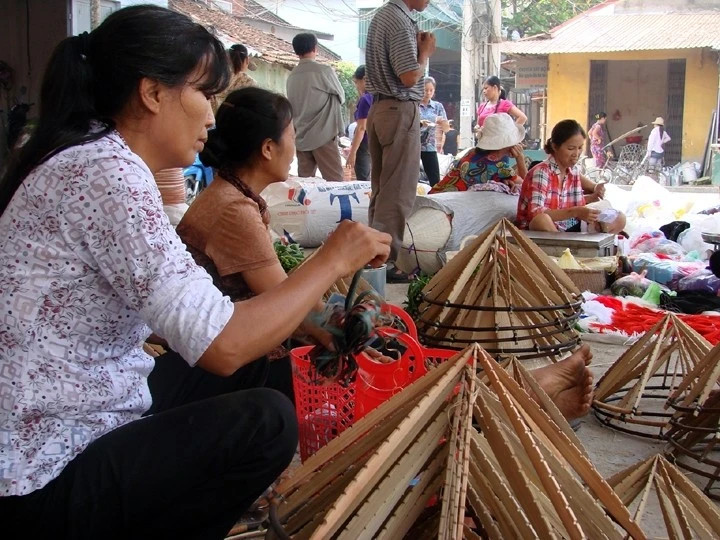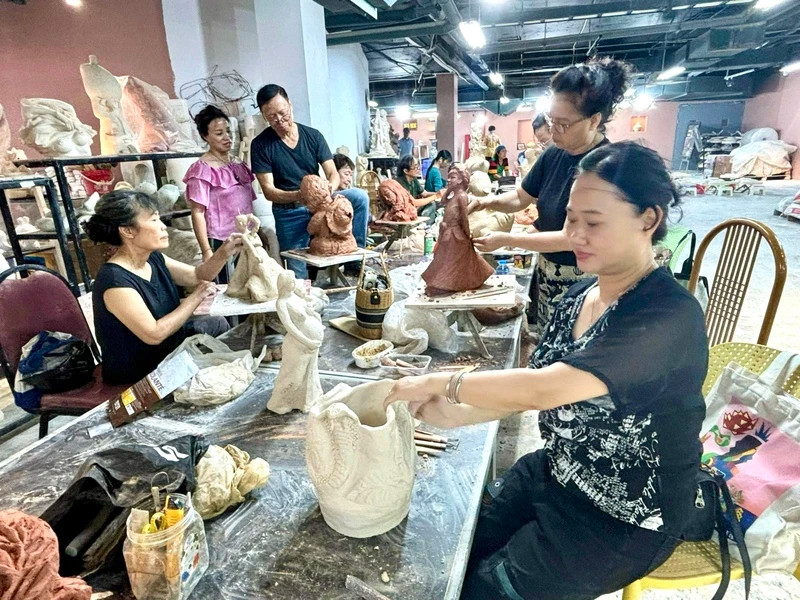On May 7, 2018, the Prime Minister issued Decision No. 490/QD-TTg, approving the OCOP Programme to promote the strengths and characteristics of each locality to promote sustainable rural economic development, thus contributing to shifting the economic structure and labour structure in rural areas.
This is also an important breakthrough in approaching rural economic development with the goal of developing forms of production and business organisation; shifting economic structure, improving income and living standards for people and effectively implementing the "economy and production organisation" group of criteria in the National Criteria Set for New-style Rural Communes and implementing industrialisation and modernisation of agriculture and rural areas, promoting a reasonable rural labour structure shift, protecting the environment, and preserving good traditional values.
According to the Office of the Coordination of the New-style Rural Development Programme of Hanoi, Hanoi has been the leading locality in the country in implementing the OCOP programme; it has been recognised as having more than 2,710 products, accounting for about 25% of the total number of OCOP products in the country.
To date, the whole city has 1,350 craft villages. The production value of Hanoi's craft villages currently reaches more than 24 trillion VND per year.
Craft villages have been actively contributing to the restructuring, developing the rural economy, creating jobs for thousands of workers, contributing to the successful implementation of the New-style Rural Development Programme in the city.
 |
| Traditional incense-making in Quang Phu Cau Commune, Ung Hoa District. |
The products of craft villages are not only known to domestic consumers but have also become "ambassadors" of a Vietnamese culture with a strong identity that is favoured and praised by foreign tourists.
In the chain of OCOP products of the capital, there is a unique lotus silk product in Vietnam produced by artisan Phan Thi Thuan, Phung Xa Commune, My Duc District. Her "Lotus silk scarf" product under My Duc Mulberry Silk Company Limited has become a potential 5-star product.
In Bat Trang, Gia Lam District, there are currently four products of Quang Vinh Ceramics Company Limited which have been recognised as 5-star OCOP products out of the total of six 5-star OCOP products of Hanoi. So far, the company's products have been exported to many international markets such as: Japan, the US, Germany, the UK, and France.
Each craft village, each OCOP product of each locality has its own very unique and sophisticated identity imbued with national cultural identity, contributing to the sustainable development of the rural economy and people's lives.
Along with the good results achieved, in order for OCOP products to develop stably and sustainably, manufacturers and craft villages must both research the market, assess consumer tastes according to the increasing trend, and ensure stable, high-quality and legal input materials.
These are strict standards of the market and managers in the digital age, especially for importers in developed countries; and is also the difficulty of OCOP product manufacturers today.
 |
| Conical hat making in Chuong Village, Thanh Oai District. |
Recently, to solve the difficulty in input materials, craft villages have formed a linkage model between enterprises and households in some craft villages to convert input materials in these craft villages. In this linkage, enterprises will provide input wood for households to replace natural forest wood sources, provide technology advice and management methods, and support promoting the consumption of output products.
Thanks to the linkage with wood importing enterprises, recently, the majority of production households in Lien Ha Craft Village have switched to using imported wood of legal origin, in order to ensure the output market for the craft village's wood products and adapt to the new market situation.
Minister of Agriculture and Rural Development Le Minh Hoan shared that each OCOP product integrates multiple values, with pride in indigenous cultural values. Nowadays, consumers are no longer just buying products but also the way they are created, including the mindset, culture, stories, and emotions in the process of creating products. Hanoi is on the right track in exploiting indigenous cultural values and local strengths to develop OCOP products. The introduction and promotion of OCOP products associated with events and festivals are organised more and more professionally, thus attracting consumers.
Behind each OCOP product is the cooperation of many people, contributing to activating the rural economic sector, shifting towards creating products with high added value.
Therefore, along with creating mechanisms and policies to encourage and promote the development of craft village products, it is necessary to improve the quality, aesthetics, and cultural identity of the products.
To enhance the indigenous cultural value in each OCOP product, Hanoi needs to pay more attention to craft village development policies, with a focus on training highly qualified human resources, legal and quality production materials, having management policies to minimise environmental pollution, developing craft villages associated with tourism to bring about multi-purpose economic value, and linking and supporting each other for mutual development.
In the 2021-2025 period, Hanoi City aims to have 2,000 products evaluated and classified under the OCOP Programme. As of the beginning of 2024, Hanoi has evaluated and classified 1,657 products. By the end of this year, districts and towns in the city will have completed registration to evaluate and classify more than 510 products. With this result, Hanoi is expected to exceed the set target one year ahead of schedule for the OCOP Programme.
















